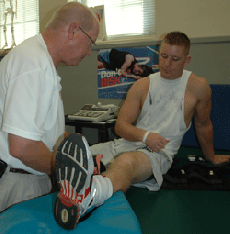ACL tears end season early

This article was originally published prior to June 2, 2013. Due to a change in the content management systems, the initial publication date in not available.
When former senior outside hitter Emily Grabner went up for a kill mid-season last year, she didn’t think her career as a Baker University volleyball player would end due to injury.
Grabner was in for nine to 12 months of surgery and rehabilitation caused by the tearing of the anterior cruciate ligament (ACL) of her knee.
“I was just playing a game, and I went up to hit the ball and came back down and tore it,” Grabner said. “My knee just blew out.”
Although tearing the ACL is common in volleyball, athletes of other sports experience the same form of injury every year.
“I tore my ACL during the football game against Graceland University,” junior linebacker Chris Campbell said. “I went down on kickoff, and I was blind sided. My knee just kind of turned.”
Director of Sports Medicine Lynn Bott said the season is usually over for an athlete who tears an ACL.
“After an ACL injury is suffered, the athlete is usually out for the remainder of the season,” Bott said.
Because the injury entails a long rehabilitation process, an ACL tear means the end for some athletes’ careers.
Grabner, who now serves as an assistant volleyball coach at Baker, said suffering the injury during her final year was difficult to overcome.
“It was very sad because it was such a traumatic injury that is very hard to come back from,” she said.
Sophomore linebacker Chad Cross suffered an ACL injury in the beginning of last season. He said despite rehabilitation his performance on the field has not fully recovered.
“It still affects me because I was starting last year, and I was having one of the best seasons of my life,” Cross said. “It is terrible to come in and not be the same athlete you were before.”
In order to fully recover, Bott said an athlete has to go through a series of painful surgeries and physical therapy sessions.
After the surgery, the athlete has to see a physician to undergo rehabilitation for six to eight months.
“The training is definitely painful,” Cross said. “If you don’t have enough training then the strength of your knee and speed of your knee won’t come back as fast.”
Even after surgery and training, Bott said some athletes need additional help.
“I’ve seen this injury from the college level and the high school level, and it is devastating,” he said. “Sometimes an athlete does need counseling.”
Even though the injury can have serious effects on the individual, Bott said the team also suffers as a whole.
“All of a sudden, you have lost your leader, you’ve lost the coaching ability of the athlete,” he said. “Sometimes there is more psychological than physical damage because it is just hard on them.”






